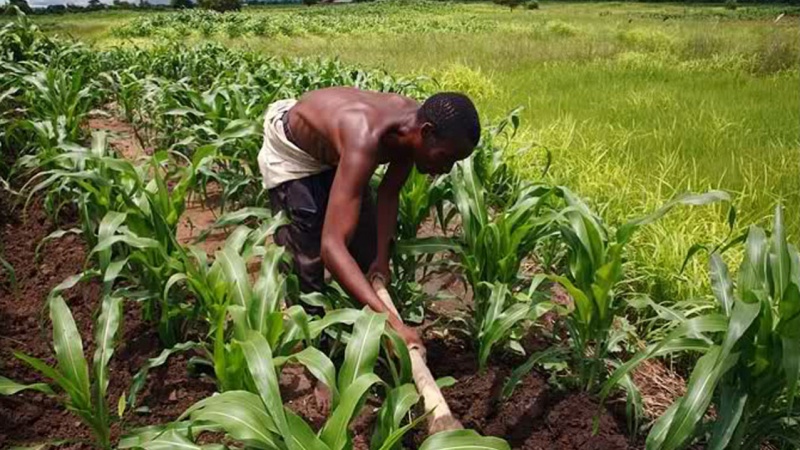
The Peasant Farmers Association of Ghana (PFAG) has expressed worry about the persistent smuggling of subsidised fertilisers to neighbouring countries, saying it is affecting government’s Planting for Food and Jobs programme.
According to the Association, the situation is especially prevalent in the Upper East and West Regions, as their proximity to the Togo and Burkina Faso borders have made it easy for the smugglers to do so.
“The smuggling is basically from the Upper West and Upper East Regions. They are bounded by Burkina Faso and Togo and so it becomes easier for people to smuggle the fertilisers across these borders. There are several instances when people who were not farmers managed to take hold of those fertilisers and take them across the border to sell at a higher price,” Charles Nyaaba-Programmes Officer, Peasant Farmers Association, told the media during a sensitisation meeting for farmers on the Planting for Food and Jobs programme.
Government in 2017 instituted a programme to slash – by half – the cost of fertilisers to farmers, replacing free fertilser distribution under the previous government. However, some unscrupulous people have resorted to smuggling the fertilisers to neighbouring countries to sell at a higher price, depriving Ghanaian farmers from getting fertiliser at low cost.
Thus, Mr. Nyaaba said, his outfit in an attempt to battle this canker has set up a watchdog to track the smugglers and hand them over to the police – but lack of cooperation with them has rendered their efforts ineffective.
“We instituted what we call fertiliser watchdogs, but several constraints wouldn’t allow them to prevent the smuggling. There were occasions when they impounded some trucks and those trucks were released next day by the police. Secondly, they are not recognised by the smugglers to be the legitimate people to stop them,” he said.
Also commenting on the same issue, Ms. Victoria Adongo-Programme’s Cordinator, PFAG, recounted a sad incidence when one of the watchdog members who impounded a smuggled truck was called by the DCE and Regional Minister – and warned not to try and bring disrepute to the ruling party.
“In the Upper West Region, one of our watchdogs impounded a big truck of smuggled fertiliser and reported to the security agencies. But what happened was that the District Chief Executive and Regional Minister called him and warned him that he was trying to do something that could affect the fortunes of the [ruling] party,” she said.
The situation, the association said – if not attended to with all seriousness and immediately – will affect the Planting for Food and Jobs programme’s success.
“It is affecting the Planting for Food and Jobs programme, in that government can report that it has distributed, say, ten tonnes of fertilisers to the farmers – but at the end of the day, maybe only eight tonnes reached them. This will lead to low harvest; and at the end of the day, Planting for Food and Jobs won’t achieve its purpose,” Mr. Nyaaba said.
Despite this major challenge, the association commended government for bringing on board the Planting for Food and Jobs programme, which it says is already impacting the lives of smallholder farmers in the country.
Among the impacts are that the programme has increased from 10 percent to 25 percent the number of farmers buying certified seeds; and has also increased local seed production from 4,000mt to 9,000mt.
Source : www.thebftonline.com

































